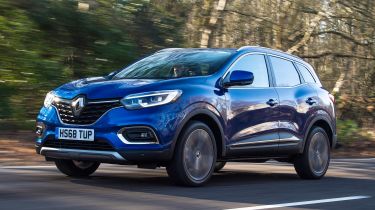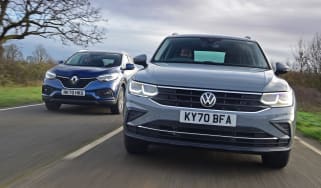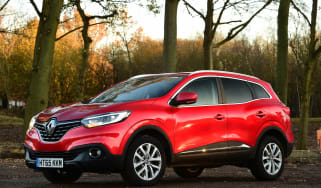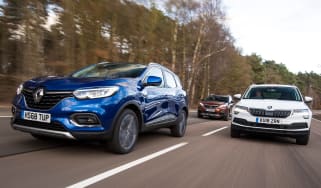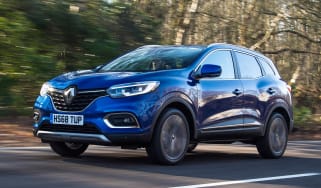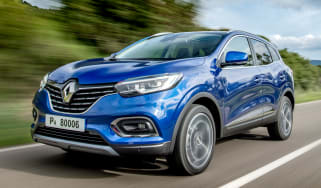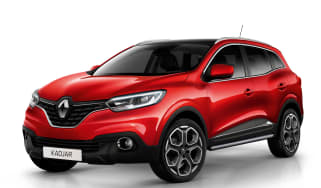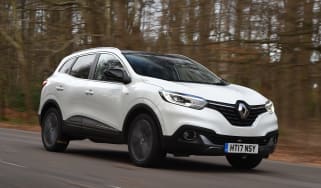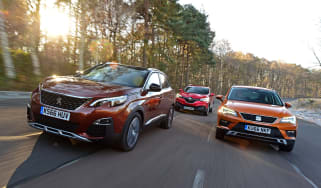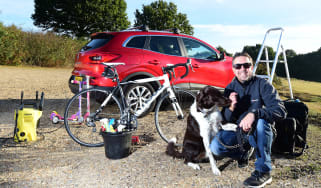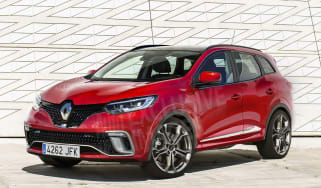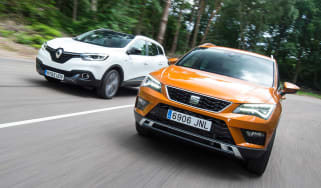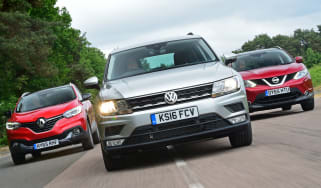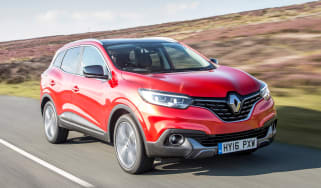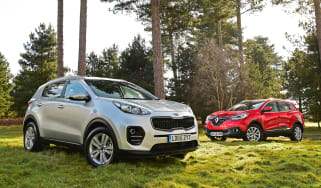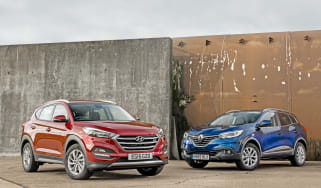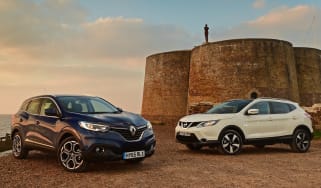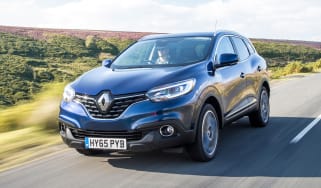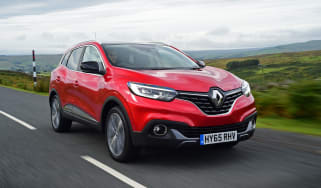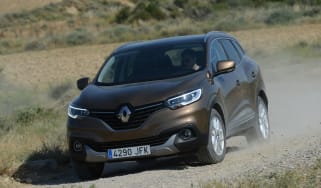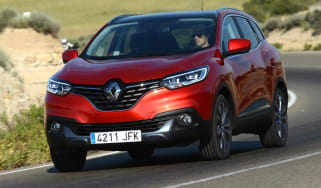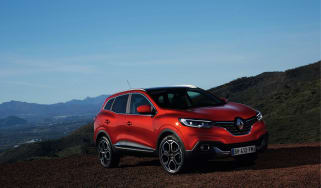Renault Kadjar (2015-2022) review
The Renault Kadjar takes the Nissan Qashqai’s talents and wraps them in a more stylish package

Renault Kadjar review
The Renault Kadjar is a stylish crossover that's based on the same platform as the Nissan Qashqai. But, while the Qashqai took undisputed class honours when it arrived in early 2014, the game has moved on since. The Kadjar feels pretty much the same to drive as the Qashqai, yet does so while offering more space at a lower price. However, it but still just loses out to all-rounders like the SEAT Ateca and Peugeot 3008.
Despite this, the Renault Kadjar’s winning blend of desirability, quality, practicality and low running costs make it a deserved family favourite. We’d go for the lower-powered 1.3 140 TCe petrol in mid-spec Iconic trim, as it feels almost as powerful as the 1.3 TCe 160 and comes loaded with standard kit. If you're after a diesel, the entry-level 1.5 dCi makes more sense than the powerful 1.7 dCi - unless you intend to tow a trailer or really need four-wheel drive.
The launch of the Renault Kadjar caused a bit of a stir in 2015. While the firm had dabbled in the mid-size crossover class before with the unloved previous-generation Koleos, the Kadjar is a wholly different proposition. In effect, Renault has taken the Nissan Qashqai - Renault and Nissan are joint manufacturing partners - and formed the Kadjar for its own needs.
Used - available now

2025 Audi
A5 Sportback
11,300 milesAutomaticPetrol2.0L
Cash £30,000
2024 Volkswagen
Golf R
28,600 milesAutomaticPetrol2.0L
Cash £30,000
2023 Tesla
Model 3
19,657 milesAutomaticElectric
Cash £19,197
2024 Land Rover
Defender 110
54,224 milesAutomaticDiesel3.0L
Cash £53,950While the two brands claim that only 60% of parts are shared between the two models, Renault said that 95% of what you see and feel in the Kadjar is completely new. In essence, much of the driving experience is similar, but the Renault is both slightly more practical and a little cheaper than the Qashqai.
There's a single bodystyle for the Renault Kadjar, and it slots into the Renault range above the Captur and below the larger Koleos. A range of updates introduced towards the end of 2018 further increased the Kadjar's appeal: the exterior gained mild styling changes, while inside received greatly simplified climate controls and a slicker, more neatly integrated infotainment system.
Most importantly, the entire Renault Kadjar engine lineup was overhauled, all of the power options gaining emissions-reducing exhaust particulate filters. A pair of new 1.3-litre turbocharged petrol engines - offering 138bhp and 158bhp - replaced the old 1.2 and 1.6 units, and each offered improvements in both performance and efficiency. The lesser-powered unit is offered with a choice of six-speed manual and seven-speed automatic gearboxes, while the 158bhp version is manual only.
The 1.5 dCi diesel gained a series of upgrades for 2018, which introduced small improvements in power, efficiency and refinement. The top of the diesel range saw the old 1.6 replaced by a 1.7-litre option. Based on the outgoing unit, the new model brought a significant power increase. The 1.7 comes with a six-speed manual, and is the only Kadjar that is offered with four-wheel drive. However, if you want an auto you still have to make do with the less-than desirable X-Tronic CVT box.
The Kadjar is offered in a choice of four trim levels. The range kicks off with the Play, which gets 17-inch alloy wheels and rear parking sensors as standard. The next step up, the Iconic, is the pick of the range, adding sat nav and 19-inch wheels; and above that are the S-Edition and the top spec GT Line.
How much does the Renault Kadjar cost?
New models start at around £22,000 for the Iconic trim and reaching up to £28,200 for the GT Line variant. Used Kadjars are available from approximately £3,000 depending on age, mileage, and condition. Leasing options are also available, with monthly payments starting from about £195 for the Iconic trim on a 48-month lease.
Engines, performance and drive
Not many people are likely to take the Renault Kadjar off-road, but while there are more rugged compact 4x4 options available, the Kadjar can still do a reasonable job away from the tarmac. This is especially true of the 1.7-litre diesel - it's the only model in the range offered with four-wheel drive, and its 50:50 differential lock function helps to boost traction when mud-plugging.
The Kadjar’s handling on the road isn’t the most involving, but it always feels secure and composed. Renault uses a system called Understeer Logic Control that applies the brakes to individual wheels to help the car hold its line through corners. However, the set-up doesn’t feel as natural as the XDS electronic differential fitted as standard to the SEAT Ateca, and there simply isn't as much grip. The steering offers little in the way of feel either, but it is light and precise, which makes the Kadjar easy to drive at parking speeds and around town.
Also on the plus side, the Kadjar scores strongly for refinement. Even though the 19-inch wheel and tyre combination delivers more road noise than you'll notice in a Peugeot 3008, the interior is well insulated from wind noise. The suspension does struggle with poorer surfaces, however, and the car fidgets and crashes around more than the Skoda Karoq.
0-62mph acceleration and top speed
The Renault Kadjar is available with four engines. The 1.3-litre TCe turbo petrol develops 138bhp, and can do 126mph and 0-62mph in 10.4 seconds - with maximum pulling power from just 1,600rpm. It's the best option in the engine lineup: it feels more than nippy enough on the open road, and for the most part it feels smooth - the exception being under very hard acceleration, where it starts to sound a little gruff.
It's good enough, in fact, that the more powerful unit won't really offer any benefits for anyone other than those who regularly intend to carry five people and a full boot. The extra 20bhp and 20Nm it offers are both delivered higher up the rev range, so in most situations it hardly feels any quicker than the lower-powered model. This is reflected in the performance figures: 0-62mph drops by only 0.5 seconds, and top speed increases by 4mph.
The 1.5-litre diesel option is better than ever. It makes 5bhp more than before (now 113bhp) and an overboost function means that there's a healthy extra dose of torque on offer when overtaking. Performance is only modest - 0-62mph takes 11.7 seconds - but the power delivery is smooth and refinement is excellent.
The 1.7-litre model is the ideal choice for drivers who wish to tow: it's the torquiest unit in the range, and the 148bhp output adds a more muscular shove when carrying heavy loads.
MPG, CO2 and running costs
Changes to the Kadjar range in 2018 introduced exhaust particulate filters to the entire engine lineup. This in part helps to deliver impressive fuel consumption results: the 1.5 dCi diesel auto returns 57.7mpg on the combined cycle and CO2 emissions of 128g/km. The manual option is only marginally behind, with official figures of 56.5mpg and 131g/km. Combined with the Kadjar’s 52-litre fuel tank, that gives the 1.5 dCi a potential range of almost 700 miles.
The 1.3-litre (138bhp) petrol with manual transmission returns 42.8mpg and emits 147g/km of CO2, while the auto version manages a little better economy with 43.5mpg. The more powerful 158bhp variant delivers 44.1mpg and emits 149g/km of CO2.
Insurance groups
Insurance groups for the Kadjar range from 17-25, with the 148bhp diesel GT Line versions attracting the most expensive premiums.
Depreciation
The Kadjar doesn't perform too well on the second-hand market. Average residual values for the Renault crossover sit at around 38%, over 3-years and 36,000 miles.
To get an accurate valuation on a specific model check out our free car valuation tool...
Interior, design and technology
The Renault Kadjar arguably has more character than the slightly generic Nissan Qashqai. Its big, bold nose with the massive Renault logo is very concept car-like, and the swept-back headlights make it immediately more striking to look at.
This is complemented by the curvaceous bodywork and panel creases that help give this tall vehicle a stylish swooping stance. Round the back, the modern design theme is maintained by some distinctive, shapely tail lamps. The Kadjar looks fine on the 17-inch alloy wheels, but it's the 19-inch diamond-cut wheels that really make the car stand out - as does the Flame Red metallic paint, which is one of eight available body colour choices.
Inside, apart from the digital instrument dials, the Kadjar doesn’t feel quite so futuristic – the layout is fairly functional, but rivals like the Peugeot 3008 and Skoda Karoq feel more special. Updates in 2018 improved things, though: the old car's fiddly air conditioning controls were replaced with big, simple rotating dials each inset with individual display screens, and the infotainment screen became integrated into the dashboard much more neatly. Overall quality is good, too, with soft-touch materials used in most places that you'll see while driving. Harder and more brittle plastics are used lower down in the car, but overall everything seems pretty robust and well put together.
Sat-nav, stereo and infotainment
The 2018 revisions introduced an infotainment setup that sits flush with the dashboard. It looks much neater than it did before, though some users might miss the physical volume controls. At least physical controls remain on the shortcut stalk on the steering column.
The R-Link 2 infotainment system itself isn't the best in the class. Loading times are a little slow, and the graphics looks rather fussy, which means at times it isn't as easy to use as rivals' setups. This is compounded by a screen which, measuring seven inches, is smaller than the best systems available. All but the entry level model get TomTom navigation though, which includes free traffic and map updates for the first 12 months after purchase. Addresses are easy enough to input, while traffic hold-ups are flagged up early.
Unlike the pre-facelift cars, all Kadjars now get both Apple CarPlay and Android Auto as standard. Connecting a smartphone via a USB cable or Bluetooth is straightforward, and both of these systems are superior to the in-built system in terms of graphics, loading times and mapping. The high-end S-Edition and GT Line models feature a solid-sounding Bose audio system, which features seven speakers and a separate subwoofer in the boot, but this means there's no option to add a space-saver spare wheel.
Practicality, comfort and boot space
While the Kadjar is based on the same platform as the Qashqai and has similar dimensions, Renault's designers decided to lengthen the rear overhang to give their car more boot space. As a result, capacity is up by 42 litres over the Nissan to a rather impressive 472 litres. This is, however, still smaller than the likes of the SEAT Ateca (510 litres) and the Peugeot 3008 (520 litres). Fold all the seats down and total load volume increases to 1,478 litres, which will be more than enough for most people.
There are numerous storage spaces throughout the rest of the car, too. The front door bins were increased in size for the late-2018 updates, with enough space available for a 1.5-litre bottle. However, the introduction of air vents and USB ports for rear passengers have shrunk the central cubby space. The central cupholders, while improved relative to the old car, are still comically shallow. Many rivals offer more storage space in this class.
Dimensions and size
At 4,449mm long and 1,836mm wide, the Kadjar is shorter and narrower than a Ford Kuga or Mazda CX-5. Yet despite the fact the Renault Kadjar is essentially a lengthened Nissan Qashqai, it doesn’t really feel any bigger from behind the wheel. That is despite the tall right height and commanding view from the driver’s seat – both of which help provide decent visibility.
Leg room, head room & passenger space
Space in the back is good, but isn’t quite the best in class. Legroom is good but taller adults may find headroom a little tight, especially in Kadjars equipped with a panoramic sunroof, which eats into space. Overall the space in the back is fine for a family – but a Mazda CX-5 is slightly roomier.
Boot space
The Renault Kadjar is a practical car, and its boot surpasses the already practical Nissan Qashqai by 42 litres. That means a total load volume of 472 litres, or 1,478 litres with the rear seats folded down. While that’s good, a SEAT Ateca is bigger still, boasting 510-litres and 1,604-litres respectively.
The two top-spec Kadjars get a flexible boot floor, which can be divided to partition the storage area, or raised up to create a flat load bay with no lip when you fold the seats down. These models also get one-touch release, which allows you to lower the 60:40 split bench from the boot. There’s no seven-seat option which, due to the five-seat only nature of the bigger Koleos, means that the entire Renault SUV family is five-seat only.
Reliability and safety
The Renault Kadjar shares many of its parts with the Nissan Qashqai, but it finished behind the Nissan in our 2020 Driver Power survey. However, with a replacement Kadjar model due in 2021, the manufacturer will be expecting a climb up the rankings.
Renault itself finished 15th out of 30 manufacturers in the customer satisfaction poll, ahead of rivals such as Citroen, Volkswagen and Ford.
The Kadjar earned a five-star rating when it was tested by Euro NCAP in 2015, just like the Nissan Qashqai. All but the entry-level model has a lane departure warning, while top-spec cars include a speed alert with traffic sign recognition and a blind spot warning system. Reversing sensors are offered as standard with the Play trim, but all other equipment levels add front sensors and a reversing camera.
Warranty
Renault offers warranty cover for up to 5 years, with unlimited mileage during the first 24 months, then limited to a total of 100,000 miles or 5 years.
Servicing
The Renault Kadjar is, of course, available with all the same servicing plans and offers as the rest of the product range. Scheduled servicing is every 12 months or 12,500 miles, and owners can purchase a package that covers this for a set period of time.
Renault Kadjar Alternatives
The Kadjar stands as one of a range of cars deserving of serious consideration in the crossover sector. As well as the mechanically similar Qashqai, its chief rivals are the SEAT Ateca Kia Sportage, Hyundai Tucson and our current class favourite, the Peugeot 3008. But that's not all, as the Kadjar also has competition in the form of the Skoda Karoq, MINI Countryman, Ford Kuga, Mazda CX-5, VW Tiguan, Honda CR-V, Toyota RAV4, and many others.

